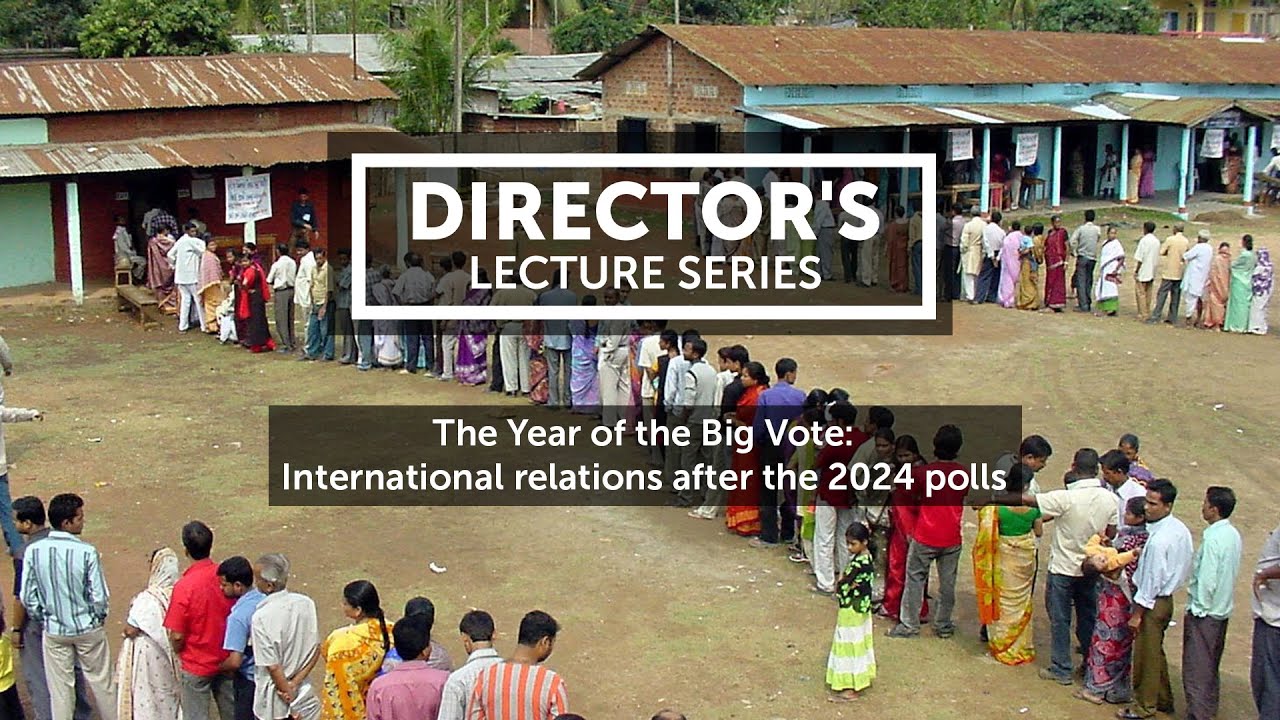The year of the big vote: Do we have the world leaders we need?


More than 2 billion people in 50 countries will be invited to vote in 2024. BA student Saleeta Akbar reports on the latest Director’s Lecture Series, where SOAS academics and policymakers met to address the key elections and discuss what's at stake.
Visionary leaders are important in tackling multifaceted issues in the age of deep polarisation, rampant inequality, and resurgent populism. In the changing currents of global politics, where nearly a third of the world’s population is registered to cast their votes this year, the latest Vice-Chancellor's lecture in the series asked the question: Do we possess the leadership needed right now?
I attended the lecture, where experts offered their analyses of the implications of elections around the world. Professor Adam Habib, SOAS’s Vice Chancellor, moderated the lecture, which featured panellists, including Professor Leslie Vinjamuri, Dr Subir Sinha, Professor Stephen Chan, OBE, and Anthony Dworkin, Senior Policy Fellow at the European Council on Foreign Relations. Here are some of the insights I gained from the discussion:
Europe is at a crossroads
The European Parliament elections across Europe this year will likely lead to a rise of populism and the far right, according to Anthony Dworkin, Senior Policy Fellow at the European Council on Foreign Relations. From Russian aggression to the threat of climate change and immigration, Europe is at a crossroads, battling with existential questions of identity and unity.
Visionary leaders are important in tackling multifaceted issues in the age of deep polarisation, rampant inequality, and resurgent populism.
Anthony added that it is vital for Europe to assert itself as a significant international actor in terms of politics. The recent developments in the conflict between Russia and Ukraine underscores the urgency of the situation. As Russia appears to gain ground, there is a sense of pessimism among the European public. There is fear that Ukraine’s plight might just be the tip of the iceberg, with Russia moving towards a more aggressive stance by threatening other EU countries.
Moreover, the threat of Trump regaining power adds another layer of uncertainty to Europe's predicament as there is a possibility of the United States withdrawing support and leaving Europeans to themselves if defence spending targets aren’t met. Ultimately, Europe's ability to navigate these challenges hinges on its capacity to forge unity, which is possible with an effective administration and parliament.
Majoritanism is at large in India
Majoritarianism is at large in India, backed up by economic disparities and religious inequality. In the talk, Dr Subir Sinha, Director of the SOAS South Asia Institute, unravelled the complexities of Indian and Indonesian politics, where authoritarianism blurs the lines of governance.
India has become a state of authoritarianism with some elements of democracy “driven by misinformation, fake news, almost complete control over television media and a complete domination of social media spaces”. Due to this, the predictability of this year’s elections might be difficult to sustain. The influence of the BJP party and Narendra Modi in India clarifies the element of majoritarian rule as its “true democracy".
US elections remain a focal point of global attention
From the spectre of climate change to the imperative of immigration reform, the stakes of the 2024 elections loom large for the country. Professor Leslie Vinjamuri of International Relations gave a sobering assessment of US politics, where the elections remain a focal point of global attention. There are the priorities of young voters, who prioritise issues such as climate change, economic prosperity, and women's rights—a demographic that often aligns with the Democratic Party.
Trump's policies could have far-reaching implications for global stability.
On the other hand, Professor Vinjamuri delved into the potential consequences of a Trump victory, citing the Heritage Foundation's Project 2025, which outlines a radical plan to reshape the US bureaucracy. With a penchant for unilateralism and a preference for transactional diplomacy, Trump's policies could have far-reaching implications for global stability.
Trump's disregard for multilateral agreements and protectionist measures, including tariff wars with China, pose significant challenges for international cooperation. The outcomes will not only shape the trajectory of American democracy but also have an impact in the international stage, shaping global politics for years to come.
South Africa is at a pivotal moment of transformation
Turning our focus to South Africa, Professor Stephen Chan, OBE, illuminated the complexities of South African politics, where the legacy of Nelson Mandela collides with the crisis of the present.
The ruling African National Congress (ANC) face a decline in voting preference, potentially leading to coalition-building. Opposition forces, including the Democratic Alliance and the Economic Freedom Fighters led by Julius Malema, present formidable challenges amidst concerns over electoral fraud and pressing domestic issues. South Africa's international standing and diplomatic relations, including ties with the US and reliance on Chinese investment, add layers of complexity to its political landscape. Professor Chan's prediction of the potential coalition government, possibly involving the Economic Freedom Fighters, underscores the country's pivotal moment of transformation.
Overall, in a world marked by uncertainty and change, Adam Habib emphasises the urgent need for visionary leadership. 'The year of the big vote' compels us to confront the complexities of our shared humanity and strive for inclusivity and fairness. As we navigate this pivotal moment, let's learn from the past and work towards a brighter, more sustainable future.
Watch the lecture
The views and opinions expressed in SOAS Blogs are solely those of the respective authors and do not necessarily reflect the views of the organisation or act as an endorsement.
Image credit: Rio Lecatompessy via Unsplash.
About the author
Saleeta Akbar is an international student from Pakistan who is in her first-year studying BSc Management and working as a Co-Creator Intern for the SOAS Communications Team.




